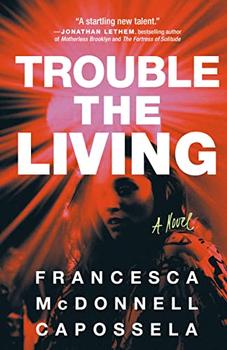Book Club Discussion Questions
In a book club? Subscribe to our Book Club Newsletter and get our best book club books of 2025!
For supplemental discussion material see our Beyond the Book article, A Brief Overview of the Good Friday Agreement and our BookBrowse Review of Trouble the Living.
Please be aware that this discussion guide will contain spoilers!
- Early in the novel, Aoife takes Ina and Brid to view the border between Northern Ireland and the Republic of Ireland. She cautions the girls to not tell their brothers, because "girls understand these things much better than fellas." Why do you suppose she undertook the journey with her daughters? What do you think she meant by this statement, and do you agree?
- What did you know about "the Troubles" before reading the book? Did you learn anything new? Was your opinion of the conflict changed in any way?
- Why do you suppose Brid refuses to tell Bernie anything about her past? Under the circumstances, do you feel her decision was the correct one?
- What parallels did you find between Bernie's life and Brid's? Did you sympathize with one character more than the other?
- Were there particular scenes in the novel that resonated with you? What did you find special about them?
- The person behind The Real IRA bombing turned out to be a woman, and Brid remarks about the number of times women were the instigators of violence. Did it surprise you to learn that women were so prominently involved?
- Brid mentions the Orange Order parades, and how they end in violence every year. Why do you think the parades are permitted to continue? Are you aware of events in other parts of the world that are similarly contentious?
- Brid feels her mother treats Ina as a daughter while she's treated like an accomplice. When she voices this, her mother tells her "You got the bigger prize." Why do you suppose Aoife regards each of her daughters differently? How does this impact each of the girls? Do you think Brid does, in fact, get the "bigger prize"?
- Bernie states that she feels like an imposter and "not a real girl." What do you suppose she means by this? Can you relate to the statement?
- As a child growing up in the 1990s, Brid knew without being told that in Northern Ireland the conflict is between Protestants and Catholics, and that it's "set in stone." Treaties signed 25-years ago have largely kept the peace in Northern Ireland, but still education and neighborhoods are heavily segregated. Is there a way, in your opinion, to overcome such deep divisions?
- Bernie feels abandoned by the adults around her. "Wasn't anyone going to look out for me? Didn't anyone realize what I was going through?" she asks herself. Do you feel Brid and Kaleb should have realized Bernie was having a tough time? How does one know when a friend or family member is hurting?
- What did you think of Brid's decision to leave Ireland after the bombing? Were you surprised by her relatives' responses when she tried to make contact afterwards?
- Bernie opines that "too much love could drown you just as well as neglect could." What do you think she meant, and do you agree with her? Do you think she experienced either too much love or neglect?
- Brid learned at the diner that "friendships only happened in the spaces where men weren't." How do you feel about this statement? Do your friendships reflect this sentiment?
- Bernie observes that Brid's worth is tied to being her mother; so Bernie concludes that her own worth is dependent on being Brid's daughter. Do you think this is true in the context of the novel? How much of our self-worth is dependent on our relationships with our children and/or with our parents?
- Brid thinks about her parish priest back in Ireland, who had been "as much a part of the conflict as any of us," and supported the goals of the IRA. What role should the church play in world events? When is it appropriate for a religious leader to take sides in a conflict, or speak out regarding a situation beyond the church?
- Bernie thinks, "I felt lucky. To have been given the choice, the ability to go back in time and unmake my mistakes. Lucky to be in control of my body, self-governing and whole. It was what we all wanted. To choose our own freedom, to choose our own pain." Do you agree with her? Do you think she made the right decision to hide her pregnancy from her mother?
- In the end, Brid debates whether to leave Ireland again, ultimately deciding to do so. Do you think she made the right decision? Do you think she'll ever return to her homeland? In your opinion is it better to make your life close to where you were raised, or far away from it?
Unless otherwise stated, this discussion guide is reprinted with the permission of Lake Union Publishing.
Any page references refer to a USA edition of the book, usually the trade paperback version, and may vary in other editions.
